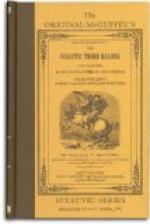LXXVII. LIVING ON A FARM. (220)
1. How brightly through the mist of years,
My quiet country home appears!
My father busy all the day
In plowing corn or raking hay;
My mother moving with delight
Among the milk pans, silver-bright;
We children, just from school set
free,
Filling the garden with our glee.
The blood of life was flowing warm
When I was living on a farm.
2. I hear the sweet churchgoing bell,
As o’er the fields its music
fell,
I see the country neighbors round
Gathering beneath the pleasant sound;
They stop awhile beside the door,
To talk their homely matters o’er
The springing corn, the ripening
grain,
And “how we need a little
rain;”
“A little sun would do no
harm,
We want good weather for the farm.”
3. When autumn came, what joy to see
The gathering of the husking bee,
To hear the voices keeping tune,
Of girls and boys beneath the moon,
To mark the golden corn ears bright,
More golden in the yellow light!
Since I have learned the ways of
men,
I often turn to these again,
And feel life wore its highest charm.
When I was living on the farm.
LXXIX. HUGH IDLE AND MR. TOIL. (221)
Adapted from the story of “Little Daffydowndilly,” by Nathaniel Hawthorne. The author was born at Salem, Mass., in 1804, and ranks among the first of American novelists. He died in 1864.
1. Hugh Idle loved to do only what was agreeable, and took no delight in labor of any kind. But while Hugh was yet a little boy, he was sent away from home, and put under the care of a very strict schoolmaster, who went by the name of Mr. Toil.
2. Those who knew him best, affirmed that Mr. Toil was a very worthy character, and that he had done more good, both to children and grown people, than anybody else in the world. He had, however, a severe and ugly countenance; his voice was harsh; and all his ways and customs were disagreeable to our young friend, Hugh Idle.
3. The whole day long this terrible old schoolmaster sulked about among his scholars, with a big cane in his hand; and unless a lad chose to attend constantly and quietly to his book, he had no chance of enjoying a single quiet moment. “This will never do for me,” thought Hugh; “I’ll run off, and try to find my way home.”
4. So the very next morning off he started, with only some bread and cheese for his breakfast, and very little pocket money to pay his expenses. He had gone but a short distance, when he overtook a man of grave and sedate appearance trudging at a moderate pace along the road.
5. “Good morning, my fine lad!” said the stranger; and his voice seemed hard and severe, yet had a sort of kindness in it; “whence do you come so early, and whither are you going?”




